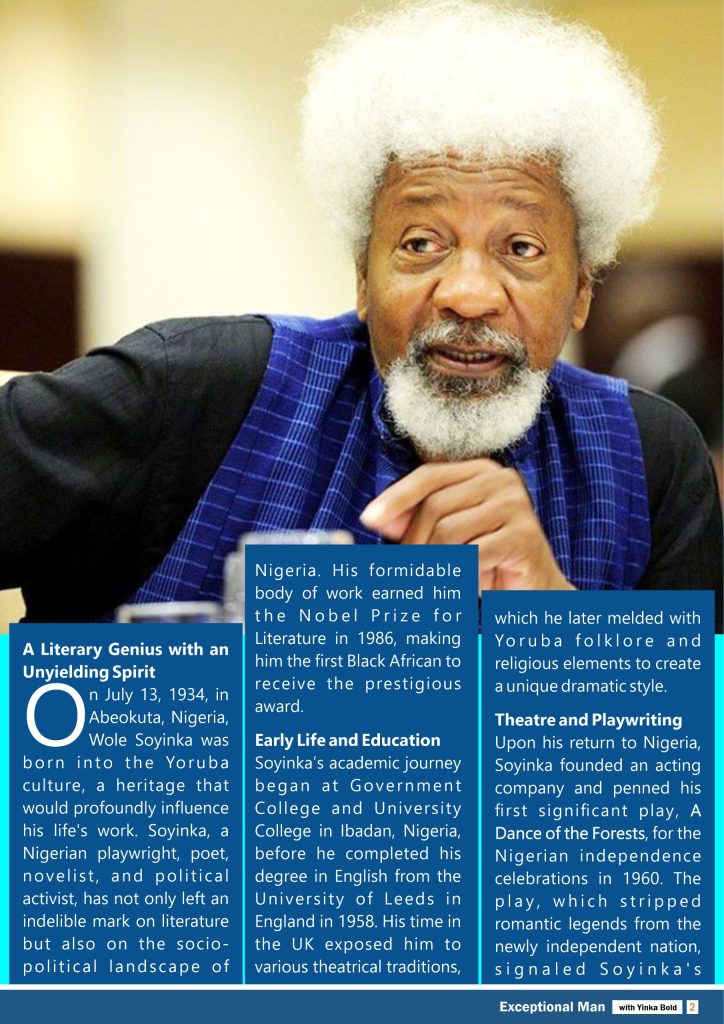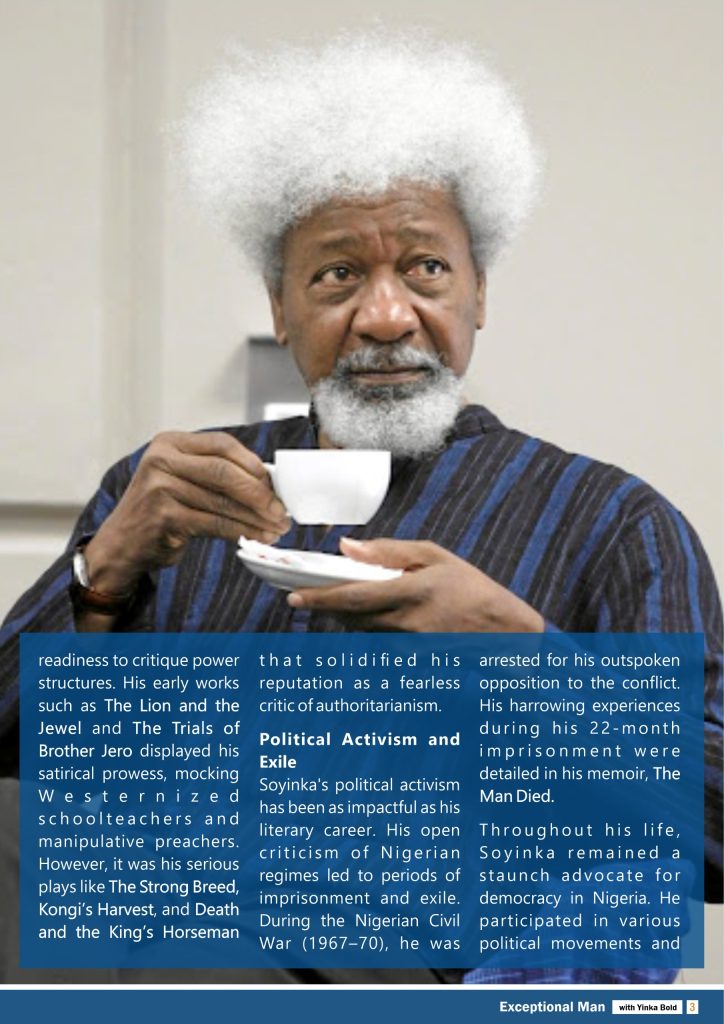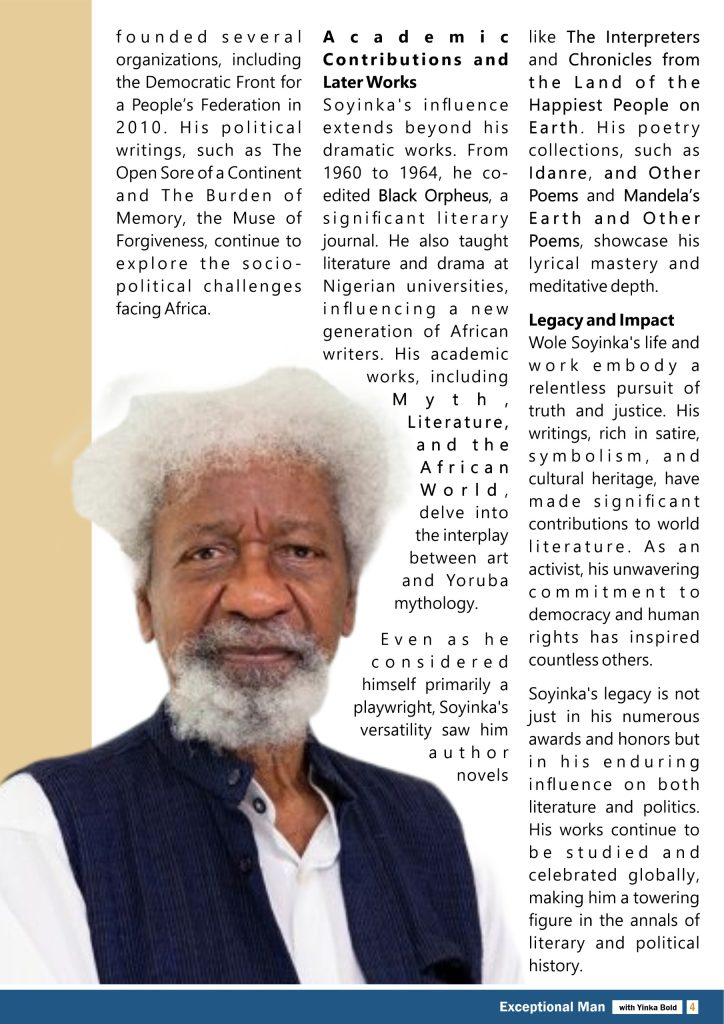A Literary Genius with an Unyielding Spirit
On July 13, 1934, in Abeokuta, Nigeria, Wole Soyinka was born into the Yoruba culture, a heritage that would profoundly influence his life’s work. Soyinka, a Nigerian playwright, poet, novelist, and political activist, has not only left an indelible mark on literature but also on the socio-political landscape of Nigeria. His formidable body of work earned him the Nobel Prize for Literature in 1986, making him the first Black African to receive the prestigious award.

Early Life and Education
Soyinka’s academic journey began at Government College and University College in Ibadan, Nigeria, before he completed his degree in English from the University of Leeds in England in 1958. His time in the UK exposed him to various theatrical traditions, which he later melded with Yoruba folklore and religious elements to create a unique dramatic style.
READ MORE: Introducing: Exceptional Man with Yinka Bold
Theatre and Playwriting
Upon his return to Nigeria, Soyinka founded an acting company and penned his first significant play, A Dance of the Forests, for the Nigerian independence celebrations in 1960. The play, which stripped romantic legends from the newly independent nation, signaled Soyinka’s readiness to critique power structures. His early works such as The Lion and the Jewel and The Trials of Brother Jero displayed his satirical prowess, mocking Westernized schoolteachers and manipulative preachers. However, it was his serious plays like The Strong Breed, Kongi’s Harvest, and Death and the King’s Horseman that solidified his reputation as a fearless critic of authoritarianism.

Political Activism and Exile
Soyinka’s political activism has been as impactful as his literary career. His open criticism of Nigerian regimes led to periods of imprisonment and exile. During the Nigerian Civil War (1967–70), he was arrested for his outspoken opposition to the conflict. His harrowing experiences during his 22-month imprisonment were detailed in his memoir, The Man Died.
Throughout his life, Soyinka remained a staunch advocate for democracy in Nigeria. He participated in various political movements and founded several organizations, including the Democratic Front for a People’s Federation in 2010. His political writings, such as The Open Sore of a Continent and The Burden of Memory, the Muse of Forgiveness, continue to explore the socio-political challenges facing Africa.

Academic Contributions and Later Works
Soyinka’s influence extends beyond his dramatic works. From 1960 to 1964, he co-edited Black Orpheus, a significant literary journal. He also taught literature and drama at Nigerian universities, influencing a new generation of African writers. His academic works, including Myth, Literature, and the African World, delve into the interplay between art and Yoruba mythology.
Even as he considered himself primarily a playwright, Soyinka’s versatility saw him author novels like The Interpreters and Chronicles from the Land of the Happiest People on Earth. His poetry collections, such as Idanre, and Other Poems and Mandela’s Earth and Other Poems, showcase his lyrical mastery and meditative depth.

Legacy and Impact
Wole Soyinka’s life and work embody a relentless pursuit of truth and justice. His writings, rich in satire, symbolism, and cultural heritage, have made significant contributions to world literature. As an activist, his unwavering commitment to democracy and human rights has inspired countless others.
Soyinka’s legacy is not just in his numerous awards and honors but in his enduring influence on both literature and politics. His works continue to be studied and celebrated globally, making him a towering figure in the annals of literary and political history.





